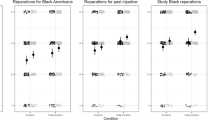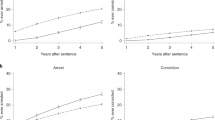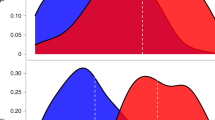Abstract
We estimate the impact of the Ramadan fasting ritual on criminal sentencing decisions in Pakistan and India from half a century of daily data. We use random case assignment and exogenous variation in fasting intensity during Ramadan due to the rotating Islamic calendar and the geographical latitude of the district courts to document the large effects of Ramadan fasting on decision-making. Our sample comprises roughly a half million cases and 10,000 judges from Pakistan and India. Ritual intensity increases Muslim judges’ acquittal rates, lowers their appeal and reversal rates, and does not come at the cost of increased recidivism or heightened outgroup bias. Overall, our results indicate that the Ramadan fasting ritual followed by a billion Muslims worldwide induces more lenient decisions.
This is a preview of subscription content, access via your institution
Access options
Access Nature and 54 other Nature Portfolio journals
Get Nature+, our best-value online-access subscription
$29.99 / 30 days
cancel any time
Subscribe to this journal
Receive 12 digital issues and online access to articles
$119.00 per year
only $9.92 per issue
Buy this article
- Purchase on Springer Link
- Instant access to full article PDF
Prices may be subject to local taxes which are calculated during checkout


Similar content being viewed by others
Data availability
The data and code of the paper are replicable and reproducible using publicly available data. The dataset and code for the current study are available at the following link: https://www.dropbox.com/s/i9ssu2mzi8zbcwb/replication_files.rar?dl=0. The link contains zipped folders that include the code and data used to run the analysis along with a README file to explain the steps needed to run the code and replicate the results of the paper.
Change history
19 May 2023
A Correction to this paper has been published: https://doi.org/10.1038/s41562-023-01629-2
References
Durkheim, E. The Elementary Forms of the Religious Life (1912).
Pew Surveys. Most US Muslims observe Ramadan fasting during Daylight Hours (2018);https://www.pewresearch.org/fact-tank/2018/05/15/most-u-s-muslims-observe-ramadan-by-fasting-during-daylight-hours/
Cho, K., Barnes, C. M. & Guanara, C. L. Sleepy punishers are harsh punishers: daylight saving time and legal sentences. Psychol. Sci. 28, 242–247 (2016).
Danziger, S., Levav, J. & Avnaim-Pesso, L. Extraneous factors in judicial decisions. Proc. Natl Acad. Sci. 108, 6889–6892 (2011).
Heyes, A. & Saberian, S. Temperature and decisions: evidence from 207,000 court cases. Am. Economic J.: Appl. Econ. 11, 238–265 (2019).
Bogdan, A., Bouchareb, B. & Touitou, Y. Ramadan fasting alters endocrine and neuroendocrine circadian patterns. Meal–time as a synchronizer in humans? Life Sci. 68, 1607–1615 (2001).
Leiper, J. B. & Molla, A. M. Effects on health of fluid restriction during fasting in Ramadan. Eur. J. Clin. Nutr. 57, S30–S38 (2003).
Dolu, N., Yiiksek, A., Sizer, A. & Alay, M. Arousal and continuous attention during Ramadan intermittent fasting. J. Basic Clin. Physiol. Pharmacol. 18, 315–322 (2007).
Hobson, N. M., Bonk, D. & Inzlicht, M. Rituals decrease the neural response to performance failure. PeerJ 5, 3363 (2017).
Santos, H. O. & Macedo, R. C. Impact of intermittent fasting on the lipid profile: Assessment associated with diet and weight loss. Clin. Nutr. ESPEN 24, 14–21 (2018).
Allaf, M. et al. Intermittent fasting for the prevention of cardiovascular disease: evidence and possible mechanisms. Int. J. Mol. Sci. 22, 8458 (2021).
Almeneessier, A. S. et al. The effects of diurnal intermittent fasting on the wake-promoting neurotransmitter orexin-A. Ann. Thorac. Med. 13, 48 (2018).
Kahneman, D., Sibony, O. & Sunstein, C. R. Noise: a flaw in human judgment. (William Collins Publishers, Glasgow, Scotland, 2021).
Campante, F. & Yanagizawa-Drott, D. Does religion affect economic growth and happiness? Evidence from Ramadan. Q. J. Econ. 130, 615–658 (2015).
McCleary, R. M. & Barro, R. J. Religion and economy. J. Econ. Perspect. 20, 49–72 (2006). 2006.
Michalopoulos, S. & Xue, M. M. Folklore. Q. J. Econ. 136, 1993–2046 (2021).
Barro, R.J. and McCleary, R.M., 2019. The wealth of religions. In The Wealth of Religions. Princeton University Press.
Montero, E. & Yang, D. Religious Festivals and Economic Development: Evidence from the Timing of Mexican Saint Day Festivals. Am. Econ. Rev. 112, 3176–3214 (2022).
Putnam, R.D. Bowling alone: The collapse and revival of American community. Simon and schuster (2000).
Rao, V. Celebrations as social investments: Festival expenditures, unit price variation and social status in rural India. J. Dev. Stud. 38, 71–97 (2001).
Norris, S., Pecenco, M. & Weaver, J. The effects of parental and sibling incarceration: Evidence from ohio. Am. Econ. Rev. 111, 2926–2963 (2021).
Dahl, G. B., Kostøl, A. R. & Mogstad, M. Family welfare cultures. Q. J. Econ. 129, 1711–1752 (2014).
Shayo, M. & Zussman, A. Judicial ingroup bias in the shadow of terrorism. Q. J. Econ. 126, 1447–1484 (2011).
Clingingsmith, D., Khwaja, A. I. & Kremer, M. Estimating the impact of the Hajj: religion and tolerance in Islam’s global gathering. Q. J. Econ. 124, 1133–1170 (2009).
Zhang, Y. et al. The effects of calorie restriction in depression and potential mechanisms. Curr. Neuropharmacol. 13, 536–542 (2015).
de Cabo, R. & Mattson, M. P. Effects of intermittent fasting on health, aging, and disease. N. Engl. J. Med. 381, 2541–2551 (2019).
Acknowledgements
We thank S. Michalopoulos, M. Kremer, P. Pinotti, P. Arnaud, E. Powell, B. Ali, E. Chaney, D. Clingingsmith, E. Zhuravskaya, E. Ash, J. Rubin, A. Sdiez and A. Shleifer for their helpful suggestions and feedback. D.L.C. acknowledges IAST funding from the French National Research Agency under the Investments for the Future (Investissements d’Avenir) programme, grant no. ANR-17-EUR-0010. A.S. acknowledges funding from the French National Research Agency under grant no. ANR-17-EURE-0020 and from the Excellence Initiative of Aix-Marseille University—A*MIDEX. This research has also benefitted from the financial support of the research foundation TSE-Partnership. S. Khalid and B. Ali provided excellent research assistance. The funders had no role in study design, data collection and analysis, decision to publish or preparation of the manuscript.
Author information
Authors and Affiliations
Contributions
S.M., A.S. and D.L.C. conceived the research, put together the data, conducted the analyses and wrote the manuscript.
Corresponding author
Ethics declarations
Competing interests
The authors declare no competing interests.
Peer review
Peer review information
Nature Human Behaviour thanks Filipe Campante, Rinchan Mirza and Nishith Prakash for their contribution to the peer review of this work.
Additional information
Publisher’s note Springer Nature remains neutral with regard to jurisdictional claims in published maps and institutional affiliations.
Supplementary information
Supplementary Information
Supplementary Sections 1–7, including Figs. 1–4 and Tables 1–15.
Rights and permissions
Springer Nature or its licensor (e.g. a society or other partner) holds exclusive rights to this article under a publishing agreement with the author(s) or other rightsholder(s); author self-archiving of the accepted manuscript version of this article is solely governed by the terms of such publishing agreement and applicable law.
About this article
Cite this article
Mehmood, S., Seror, A. & Chen, D.L. Ramadan fasting increases leniency in judges from Pakistan and India. Nat Hum Behav 7, 874–880 (2023). https://doi.org/10.1038/s41562-023-01547-3
Received:
Accepted:
Published:
Issue Date:
DOI: https://doi.org/10.1038/s41562-023-01547-3
This article is cited by
-
Writing more informative titles and abstracts
Nature Human Behaviour (2023)



